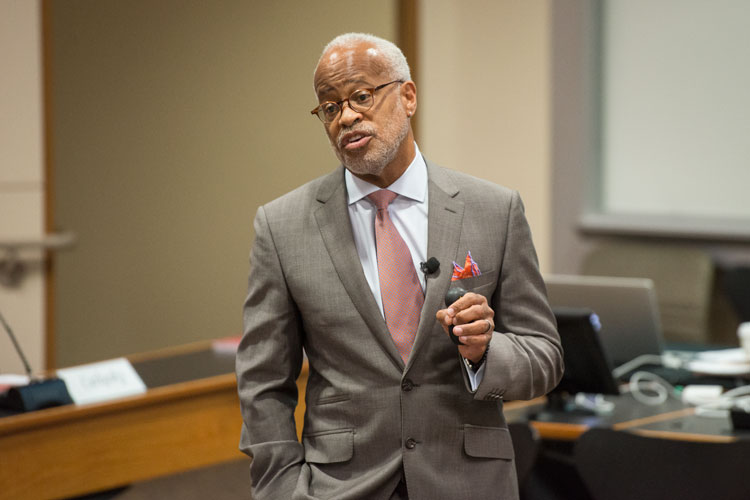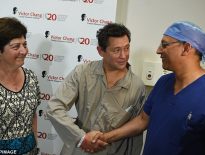The speakers at the Oct. 23 meeting were Harry J. Elam Jr., vice provost for undergraduate education; Patricia Gumport, vice provost for graduate education; Debra Satz, senior associate dean for the humanities and arts; Laura Dominguez Chan, assistant dean and associate director of career communities, Career Development Center; and Brian Cook, an analyst at Institutional Research & Decision Support.

At Thursday’s Faculty Senate meeting, discussion ranged from the progress Stanford has made redefining its approach to undergraduate education with new programs to questions about how the university can best prepare PhD candidates for a variety of careers.
One of the programs Harry J. Elam Jr., vice provost for undergraduate education, discussed in his presentation was Thinking Matters, which is designed to introduce incoming students to college-level thinking by having them tackle problems, questions and issues of significant import. It is now in its third year.
Elam said surveys have shown that the courses are popular with both students and faculty, and as a result, it has been easier to recruit faculty members to develop and teach the courses. Freshmen are required to take at least one Thinking Matters course.
He said the fear that the humanities would suffer when Thinking Matters replaced Introduction to the Humanities (IHUM) has proved to be unfounded. In fact, the two most popular Thinking Matters courses this year – What Is Love? and Evil – are humanities courses, taught by medievalists and philosophers, he said.
Elam said the 27 courses in this year’s Thinking Matters catalog present a wide range of offerings from across the university, including a course on cancer from Stanford Medical School; on the rules of war from Stanford Law School and the Political Science Department; and on meeting the global sustainability challenge from the School of Earth Sciences and the Department of Civil and Environmental Engineering.
Because students only have to take one Thinking Matters course, instead of the three courses they took with IHUM, we can have smaller class sizes, he said. We can have class sizes of 60 to 100 students, rather than the 250 that we saw in IHUM.
“What that means is that it is a more intimate experience for students, faculty and the fellows that are the section teaching staff for the course.
Elam discussed several other new programs, including Immersion in the Arts: Living in Culture (ITALIC), a yearlong residential program designed to showcase the arts as an essential part of scholarly and public life, and the future Stanford in New York, a pilot program scheduled to accept its first cohort of 20 juniors in autumn 2015.
Career trajectories for PhDs
Patricia Gumport, vice provost for graduate education (VPGE) and professor of education, said that at Stanford and around the country, there is widespread concern about career prospects for doctoral students.
To better understand the situation, VPGE teamed up with Stanford’s Institutional Research & Decision Support (IR&DS) to conduct the Stanford PhD Alumni Employment Study, which was released this month. The data has been posted on an interactive website available to anyone with a SUNet ID.
Brian Cook, an analyst at IR&DS, demonstrated how to use the interactive website to filter and drill down into the data.
Laura Dominguez Chan, assistant dean and associate director of career communities for PhDs and postdocs in humanities and sciences at Stanford’s Career Development Center, said the center has many resources available to help postdoctoral scholars and PhD students explore and choose careers – both inside and outside academia.
“At the Career Development Center, we focus on the schools of Humanities and Sciences, Engineering and Earth Sciences, and I’m excited to tell you that we actually have two new PhD/postdoc career counselors, one in social sciences and one in the natural sciences. I’ve been really thrilled to bring them on board, and have them work not only one-on-one with students, but also in the form of meet-ups [informal opportunities for students to learn from each other], programs and panels.”
Debra Satz, the Marta Sutton Weeks Professor of Ethics in Society and senior associate dean for the humanities and arts, said the humanities have been slow to recognize two important facts: that only 50 percent of PhDs land tenure-track jobs in academia, and that jobs in industry, business, government and nonprofit organizations are both possible and desirable career paths for humanities PhDs.
Satz said the academic job market is not likely to change and it’s a mistake to think Stanford is training doctoral students just for careers in academia.
“But there’s another reason that’s a mistake, which is that our PhDs go on and do amazing things outside of the academy,” she said. “It would be good for us and them to have conversations about this, instead of presenting it as a Plan B.”
Satz said she wanted to make two modest suggestions that would help dispel student fears that they will be rejected if they say academia may not be their path.
“Right from the beginning, let your PhD student know that you’re open to many different paths for this person, and that you’ll support them in whatever they choose to do,” she said. “You’ve got to repeat it and say it out loud.”
Satz said departments should hold events that bring back alumni from their programs who have chosen non-academic careers – who teach in community colleges, work in government and in the for-profit and nonprofit sectors – to demonstrate the range of possibilities open to them.
The full minutes of the Oct. 23 meeting, including the Q&A that followed the presentations, will be available next week. The next senate meeting is Nov. 6.





